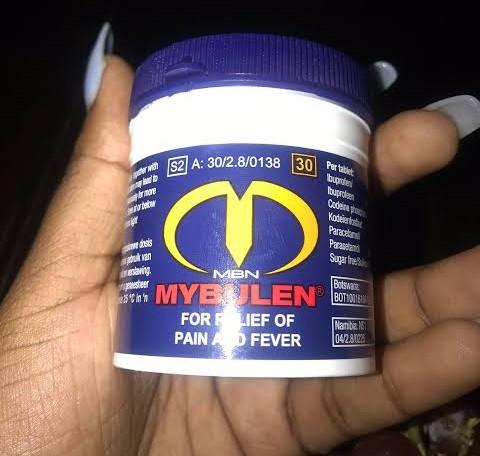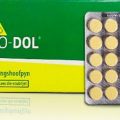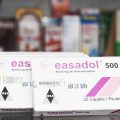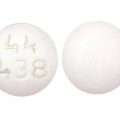Mybulen tablets is a pain medication indicated for the relief of mild to moderate pain of inflammatory origin with or without fever. Contains active ingredients including Ibuprofen, Codeine phosphate and Paracetamol.
Each mybulen tablet contains:
- Paracetamol (350mg)
- Ibuprofen (200mg)
- Codeine Phosphate (10mg).
Paracetamol: also known as acetaminophen is used to relieve pain and reduce fever in patients. It does not become habit-forming when taken for a long time. But Paracetamol may cause other unwanted effects when taken in large doses, including serious liver damage. Although rare, use of Paracetamol has been reported to lead to liver transplantation and death, usually at high doses and when multiple acetaminophen-containing products have been used.
Ibuprofen: is a nonsteroidal anti-inflammatory drug (NSAID). It works by reducing hormones that cause inflammation and pain in the body. Do not take more than your recommended dose. An ibuprofen overdose can damage your stomach or intestines. Use only the smallest amount of medication needed to get relief from your pain, swelling, or fever.
Codeine: belongs to the group of medicines called narcotic analgesics (pain medicines). It acts on the central nervous system (CNS) to relieve pain. When codeine is used for a long time, it may become habit-forming, causing mental or physical dependence. However, people who have continuing pain should not let the fear of dependence keep them from using narcotics to relieve their pain. Mental dependence (addiction) is not likely to occur when narcotics are used for this purpose. Physical dependence may lead to withdrawal side effects if treatment is stopped suddenly. However, severe withdrawal side effects can usually be prevented by gradually reducing the dose over a period of time before treatment is stopped completely.
Mybulen is used for Pain in body, Toothache, Muscles pain, Pain in teeth, Cold, Fever, Relief of mild to moderately severe pain, Menstruation pain, Joints pain, Flu and other conditions. Mybulen tablets may also be used for purposes not listed in this medication guide.
Mybulen tablets are broken down by the liver into morphine, blocking the production of a prostaglandin that is released in the body during pain, increasing the pain threshold and increasing the blood flow across the skin, preventing heat loss and sweating.
How to use mybulen tablets
- 1 – 2 capsules 4 hourly and not more than 6 capsules per 24 hour period.
- Consult your doctor if no relief is obtained with the recommended dosage.
- Do not use continuously for more than 5 days without consulting your doctor.
- Always follow the directions printed on the product insert.
You should not breastfeed while taking Mybulen tablets. Codeine can cause shallow breathing, difficulty or noisy breathing, confusion, more than usual sleepiness, trouble breastfeeding, or limpness in breastfed infants.
What are the side effects of mybulen tablets?
Tell your doctor if any of these symptoms are severe or do not go away:
- constipation
- difficulty urinating
Some side effects can be serious. If you experience any of these symptoms, call your doctor immediately or get emergency medical help:
- nausea, vomiting, loss of appetite, weakness, or dizziness
- agitation, hallucinations (seeing things or hearing voices that do not exist), fever, sweating, confusion, fast heartbeat, shivering, severe muscle stiffness or twitching, loss of coordination, nausea, vomiting, or diarrhea
- red, peeling or blistering skin
- rash
- hives
- itching
- swelling of the face, throat, tongue, lips, eyes, hands, feet, ankles, or lower legs
- hoarseness
- difficulty breathing or swallowing
- inability to get or keep an erection
- irregular menstruation
- decreased sexual desire.
Mybulen tablets may cause other side effects. Call your doctor if you have any unusual problems while you are taking this medication.
If you experience a serious side effect, you or your doctor may send a report to the Food and Drug Administration’s (FDA) MedWatch Adverse Event Reporting program online (http://www.fda.gov/Safety/MedWatch) or by phone (1-800-332-1088).
Mybulen Tablets Interaction and Precautions
Tell your doctor and pharmacist if you are allergic to ibuprofen, acetaminophen, codeine, sulfite, any other medications, or any of the ingredients in Mybulen tablets. Ask your doctor or pharmacist for a list of the ingredients.
Tell your doctor or pharmacist if you are taking or receiving the following monoamine oxidase (MAO) inhibitors or if you have stopped taking them within the past two weeks: isocarboxazid (Marplan), linezolid (Zyvox), methylene blue, phenelzine (Nardil), selegiline (Eldepryl, Emsam, Zelapar), or tranylcypromine (Parnate). Your doctor will probably tell you not to take Mybulen tablets if you are taking one or more of these medications, or have taken them within the past two weeks.
Tell your doctor and pharmacist what other prescription and nonprescription medications, vitamins, nutritional supplements, and herbal products you are taking or plan to take. Be sure to mention if you are taking any of the following: amiodarone (Nexterone, Pacerone); antihistamines (found in cold and allergy medications); buprenorphine (Belbuca, Butrans, Probuphine); bupropion (Aplenzin, Wellbutrin, Zyban); butorphanol; diuretics (‘water pills’); medications for migraine headaches such as almotriptan (Axert), eletriptan (Relpax), frovatriptan (Frova), naratriptan (Amerge), rizatriptan (Maxalt), sumatriptan (Imitrex, in Treximet), and zolmitriptan (Zomig); mirtazapine (Remeron); nalbuphine; pentazocine (Talwin); selective serotonin-reuptake inhibitors such as citalopram (Celexa), escitalopram (Lexapro), fluoxetine (Prozac, Sarafem, in Symbyax), fluvoxamine (Luvox), paroxetine (Brisdelle, Prozac, Pexeva), and sertraline (Zoloft); serotonin and norepinephrine reuptake inhibitors such as duloxetine (Cymbalta), desvenlafaxine (Khedezla, Pristiq), milnacipran (Savella), and venlafaxine (Effexor); tramadol (Conzip), trazodone (Oleptro); or tricyclic antidepressants (‘mood elevators’) such as amitriptyline, clomipramine (Anafranil), desipramine (Norpramin), doxepin (Silenor), imipramine (Tofranil), nortriptyline (Pamelor), protriptyline (Vivactil), and trimipramine (Surmontil). Many other medications may also interact with Mybulen tablets, so be sure to tell your doctor about all the medications you are taking, even those that do not appear on this list. Your doctor may need to change the doses of your medications or monitor you carefully for side effects.






